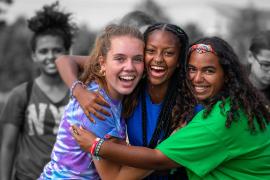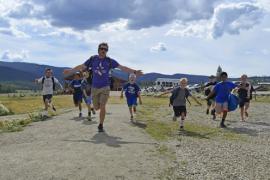 Joe Ehrmann is an accomplished man, but not just because he was an All-American football player at Syracuse University and the tenth overall draft pick in the 1973 NFL Draft — or because of his impressive professional football career. Ehrmann has committed his life to building an extraordinary resume in the areas of youth and human development and community service. After the death of his younger brother to cancer in 1978, Joe recognized the need for meaning in life, and found that meaning in reaching out to the community and helping develop young leaders. He is now a nationally recognized coach, educator, and motivator. Co-founder of Baltimore's Ronald McDonald House, Ehrmann has received various humanitarian awards, including being named one of the "100 Most Influential Sports Educators in America," by the Institute for International Sport; the "Renaissance Person of the Decade," by the Baltimore Business Journal; and "The Most Important Coach in America" by Parade Magazine. Season of Life, a New York Times best-seller and Pulitzer Prize winning book, features Ehrmann and his dynamic coaching style. ACA recently spoke with Ehrmann on the topic of leadership.
Joe Ehrmann is an accomplished man, but not just because he was an All-American football player at Syracuse University and the tenth overall draft pick in the 1973 NFL Draft — or because of his impressive professional football career. Ehrmann has committed his life to building an extraordinary resume in the areas of youth and human development and community service. After the death of his younger brother to cancer in 1978, Joe recognized the need for meaning in life, and found that meaning in reaching out to the community and helping develop young leaders. He is now a nationally recognized coach, educator, and motivator. Co-founder of Baltimore's Ronald McDonald House, Ehrmann has received various humanitarian awards, including being named one of the "100 Most Influential Sports Educators in America," by the Institute for International Sport; the "Renaissance Person of the Decade," by the Baltimore Business Journal; and "The Most Important Coach in America" by Parade Magazine. Season of Life, a New York Times best-seller and Pulitzer Prize winning book, features Ehrmann and his dynamic coaching style. ACA recently spoke with Ehrmann on the topic of leadership.
You've enjoyed a fascinating career — at what point in your life did you realize you had a message to share that would help and inspire others?
I realized I had a message right in the middle of my professional football career. I watched my little brother die of cancer, and I spent five months in the waiting room on the pediatrics oncology floor of a hospital. During those months I learned a tremendous amount about community. At the time, I read Man's Search for Meaning, by Viktor Frankl, about the search for meaning in life. Frankl wrote that the greatest of all freedoms is the ability to choose how you will respond to any situation. It was at that point when I chose to respond to those lessons I learned during my brother's illness by building a Ronald McDonald House in Baltimore dedicated to him. As I worked within the community to begin raising money for the project, I realized that I had a message that could really help a lot of people who were suffering or going through hard times.
Another thing that Frankl wrote is that you don't get to ask life its meaning, life asks you everyday what you're meaning is, and you have to show what your meaning is through your actions and character. It was at that point that I started developing my message and my voice.
Who are your heroes and why?
My heroes are really transformational leaders or people: transformational in the sense that they radically change individuals and systems. I've tried to model much of my life after Ghandi, Mandela, Martin Luther King, Jr., and Moses, with Moses being my primary coaching model for how to transform people.
There are two types of coaches: transactional and transformational. Transactional coaches cut deals with their players to get what they want out of them: "Give me this kind of work and I'll give you minutes on the field." I wanted to be a transformational coach. Transformational coaches help shape and guide who their players are. A good coach will change a player's game. A transformational coach will change their lives.
Have you observed and/or do you believe there are generational leadership differences? If so, what are the key differences?
I'm not sure there are generational leadership skills. I think leadership skills have always transcended generations. Leaders hold qualities such as integrity, vision, respect, and compassion. I think these traits have always been key to good leadership. I believe leaders are able to integrate character and courage. And I don't think that ever changes.
What I think changes over generations are the followers. In today's world, leaders must find ways to use time-honored values to reach followers who feel pressures from different things — such as social media or what they see on television — than they did a generation ago.
We know the qualities of leadership we value most. What are the qualities you see as most important when working with potential leaders, particularly young people?
The first trait is empathy. Empathy is the ability to understand what people are feeling and what causes those feelings. I think you have to be empathic with young people. When I coach, I want to create a safe, secure relationship based on integrity. I want to know how I'm impacting people.
The second quality is kindness. Maturation toward leadership comes with a lot of hiccups. You've got to deliver critiques and criticisms with kindness. You've got to understand that kids are going to make mistakes as they grow into who they are.
Another thing leaders must do is make sure they model service to others. This doesn't happen by using a top-down approach or by micromanaging. You've got to really think about how you can serve those who are following you.
And finally, you've always got to be moving toward that which you think about yourself. You have to act the way you want to be perceived. You need to figure out who you want to be and then put action to those thoughts.
What is your advice on re-charging? Even the most inspiring leaders grow weary. What do you find works best?
Everybody in the world of sports knows it's about rest and recovery. You want to work real hard because that breaks the muscles down and then as you rest and recover it builds them back bigger and stronger. Too many leaders overlook this. They overwork themselves and have no built-in time of recovery. Leaders need the spiritual disciplines of silence and solitude. Leaders need to step out of the busyness of life to reflect. This will make them stronger.
Too many leaders think recovery is idle, unproductive time. But it's some of the most important time a leader can have. You have to think about what you're doing, why, and you're impact. It's every bit as important as the hard work part.
Camp is an exceptionally good environment for developing young leaders among campers, and within staff. What is it, in your opinion, that positions camp so well to create a culture of leadership development? How is it different from other environments, like sports teams, and academic settings, etc.?
I think the intensity of the camp experience is unique. In residential camps with a 24/7 camp environment, kids get a huge opportunity to develop character. Camps give kids a chance to be consistent. Camp programs that build around character development can really make strides when it comes to producing young leaders.
Throughout a camp session, counselors and campers are given opportunities to develop compassion. There can be a lot of highs and lows, fun and pain throughout the summer, and kids and counselors get to learn how to really be there for each other in all types of situations.
The camp experience pulls everyone out of their own personal comfort zones. It's an opportunity to grow. Campers and counselors are stretched by different relationships. Kids have an incredible opportunity to individualize away from parents and to demonstrate and develop all kinds of skills — including leadership skills.
Any closing thoughts?
If you want to be a better camp counselor or leader, then you've got to be a better you. We're always trying to fix kids, but it really starts from the inside out. We want to start with the youth, but we've got to start with the counselors. It's about the integrity of your own integration of your psychological, spiritual self. It takes a lot of courage to be a counselor. You've really got to put your life out there.


